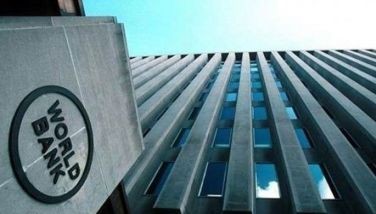Multi-sectoral groups help chart course for RP mining industry
December 4, 2003 | 12:00am
Leaders from the business sector, civil society and the government gathered at the Holiday Inn Galleria Manila yesterday for what has become the country’s largest multi-sectoral forum on responsible mining.
The National Mining Conference (NMC), which takes place Dec. 3 and 4, highlights the Arroyo administration’s resolve to help chart the course for the sustainable development of the Philippine mining industry.
Spearheaded by the Department of Environment and Natural Resources (DENR), the NMC is aimed at discussing priority areas of concerns, particularly abandoned mines, and the experiences of other countries in addressing similar concerns.
According to Environment and Natural Resources Secretary Elisea G. Gozun, "this is the first time that a forum of such magnitude is being convened by government, underscoring its resolve to work with key stakeholders in the areas of promoting mineral development, environmental protection, social equity, biodiversity, indigenous peoples and mining technologies." Another milestone is the nine-month engagement and meaningful consultation process among the government, industry and civil society, leading to the NMC
The NMC is the culminating activity of the World Bank-sponsored Philippine Mining Workshops and Conference. The initiative, which involved several regional consultations, international study tours and local mine visits, is also supported by the US Agency for International Development (USAID) and the embassies of Canada and Australia.
The DENR expressed optimism that the multi-stakeholder approach adopted by the government at the NMC will lead to the formulation of minerals policies and measures that effectively address current concerns. "We are looking at the NMC as a crucial step in revitalizing the country’s mining industry," Gozun said.
"While we are implementing many of the policy reforms for the revitalization program, we still need to address some lingering concerns such as the issue of legacy mines’ or abandoned mines, environmental degradation, host community development, among others" Gozun stressed.
The DENR chief added that "government policies that will be formulated based on the results of the conference will not only be forward-looking but will also address the unwanted legacies of past mining practices. This is the only way we can convince all stakeholders that we are serious and deeply committed to responsible mining. At the same time, this will provide clear, stable and predictable policies that are critical in attracting investments in mining."
The promotion of responsible mining is a key government program since it addresses economic concerns while adhering to the principles of environmental protection and social responsibility. President Arroyo underlined this approach in January this year when she announced the government’s shift from a policy of tolerance to the promotion of mining in recognition of the economic contributions from that sector.
The Philippine mining industry has posted significant economic contributions over the years. In 2002, the minerals industry’s production value was P34.8 billion while the value-added contribution was P15.2 billion or 1.5 percent of gross domestic product (GDP).
These figures however, do not clearly reflect the Philippines’ stature as one of the most mineralized countries in the world. Among the industry’s key challenges is the development of a national minerals policy, and the Supreme Court resolution on the constitutionality of the Mining Act of 1995.
According to Gozun, "the issues are complex but not insurmountable as long as the government allows all stakeholders to continue to engage in open and meaningful discussion. We do not expect full consensus, but we need to work together for the common good."
The National Mining Conference (NMC), which takes place Dec. 3 and 4, highlights the Arroyo administration’s resolve to help chart the course for the sustainable development of the Philippine mining industry.
Spearheaded by the Department of Environment and Natural Resources (DENR), the NMC is aimed at discussing priority areas of concerns, particularly abandoned mines, and the experiences of other countries in addressing similar concerns.
According to Environment and Natural Resources Secretary Elisea G. Gozun, "this is the first time that a forum of such magnitude is being convened by government, underscoring its resolve to work with key stakeholders in the areas of promoting mineral development, environmental protection, social equity, biodiversity, indigenous peoples and mining technologies." Another milestone is the nine-month engagement and meaningful consultation process among the government, industry and civil society, leading to the NMC
The NMC is the culminating activity of the World Bank-sponsored Philippine Mining Workshops and Conference. The initiative, which involved several regional consultations, international study tours and local mine visits, is also supported by the US Agency for International Development (USAID) and the embassies of Canada and Australia.
The DENR expressed optimism that the multi-stakeholder approach adopted by the government at the NMC will lead to the formulation of minerals policies and measures that effectively address current concerns. "We are looking at the NMC as a crucial step in revitalizing the country’s mining industry," Gozun said.
"While we are implementing many of the policy reforms for the revitalization program, we still need to address some lingering concerns such as the issue of legacy mines’ or abandoned mines, environmental degradation, host community development, among others" Gozun stressed.
The DENR chief added that "government policies that will be formulated based on the results of the conference will not only be forward-looking but will also address the unwanted legacies of past mining practices. This is the only way we can convince all stakeholders that we are serious and deeply committed to responsible mining. At the same time, this will provide clear, stable and predictable policies that are critical in attracting investments in mining."
The promotion of responsible mining is a key government program since it addresses economic concerns while adhering to the principles of environmental protection and social responsibility. President Arroyo underlined this approach in January this year when she announced the government’s shift from a policy of tolerance to the promotion of mining in recognition of the economic contributions from that sector.
The Philippine mining industry has posted significant economic contributions over the years. In 2002, the minerals industry’s production value was P34.8 billion while the value-added contribution was P15.2 billion or 1.5 percent of gross domestic product (GDP).
These figures however, do not clearly reflect the Philippines’ stature as one of the most mineralized countries in the world. Among the industry’s key challenges is the development of a national minerals policy, and the Supreme Court resolution on the constitutionality of the Mining Act of 1995.
According to Gozun, "the issues are complex but not insurmountable as long as the government allows all stakeholders to continue to engage in open and meaningful discussion. We do not expect full consensus, but we need to work together for the common good."
BrandSpace Articles
<
>
- Latest
- Trending
Trending
Latest























